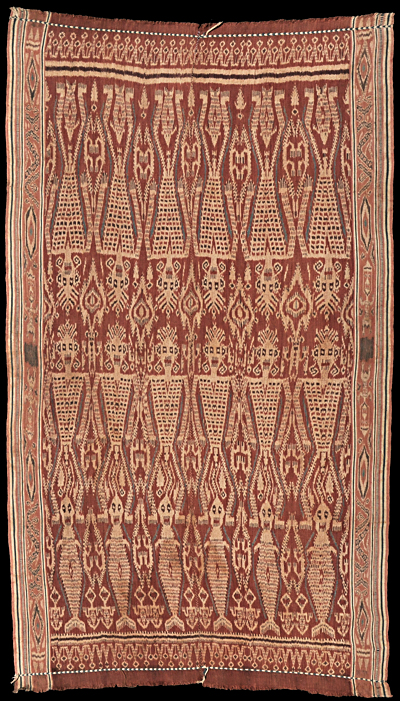| |
 
 | | | |
151 Borneo, Kalimantan
Pua (blanket)  
| | Locale: | Mualang, probably | | Period: | 19th or early 20th c. | | Yarn: | Cotton, hand-spun, medium | | Technique: | Warp ikat | | Panels: | 2 | | Size: | 135 x 230 cm (4' 5" x 7' 6") LW: 1.70 | | Design: | The most important design aspect is that the two panels are not identical. Small hidden devices reveal that the panels were ikated separately. (Hint: pick up the loupe by clicking on it, and see if you can find them.) One side is decorated with a row of six large human figures, engkaramba, with three sets of limbs, indicating that these represent extraterrestrial beings, not mortals. Between their legs are fish-like motifs. The other half shows a row of human figures of equal width but one seventh shorter, equally with a third set of limbs. In between their legs are the heads of six 'merman', half-fish, half-human. The spirit figures, antu, are here imagined as warriors with feather headdresses. The stippling on their chests may represent clothing re-inforced with fish-scales that protect them from spears and darts as on PC 038, but may also represent decorative patterns on normal war jackets. All the chief motifs are outlined in pale indigo. The borders are decorated with fish-like motifs and engkaramba with disproportionally large heads that are clearly spirit-figures. | | Comment: | Extraordinary pua with powerful headhunting associations. The overall design is remarkably similar to PC 038, but the heads here are realistic, rather than imaginary. A notable difference is the presence here of fish-like motifs and the half-fish, half-man figures. The lozenges marking the middle of the cloth may well represent trophy heads - as they do on PC 155. The cloth was done in hand spun cotton throughout, including the borders. From old Dutch collection. | | Background: | Chapters on Borneo and Kalimantan. | | Compare: | 038 | | Sources: | The drawing of the warriors is similar to that on a pua in Gavin, Iban Ritual Textiles, Fig. 72, the motif of which is identified as buah bujan mali balang, 'young warrriors pattern'. On that pua only two of the engkaramba wear similarly stippled clothing. Overall similarity with Mualang pua in Heppell, The Seductive Warp Thread, Fig. 151. Descriptions informed by input from Vernon Kedit and Michael Heppell. | | |

©Peter ten Hoopen, 2025
All rights reserved.
|
|


